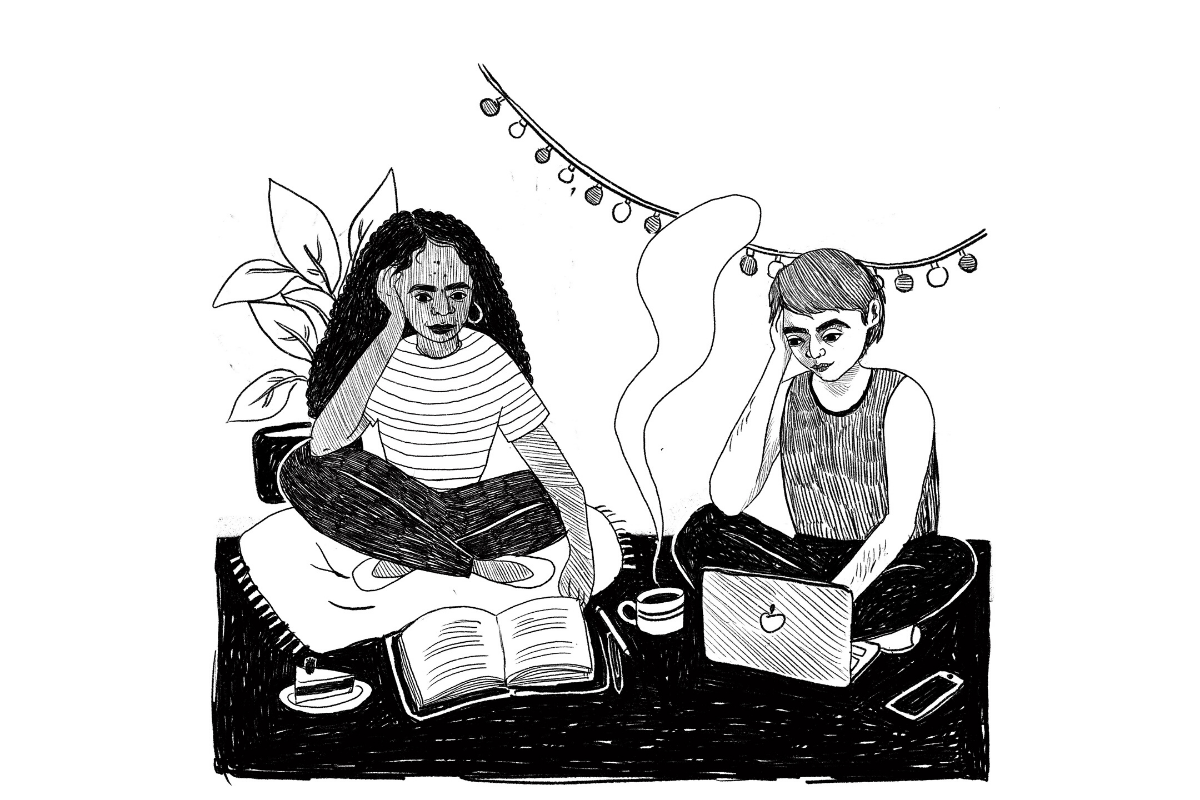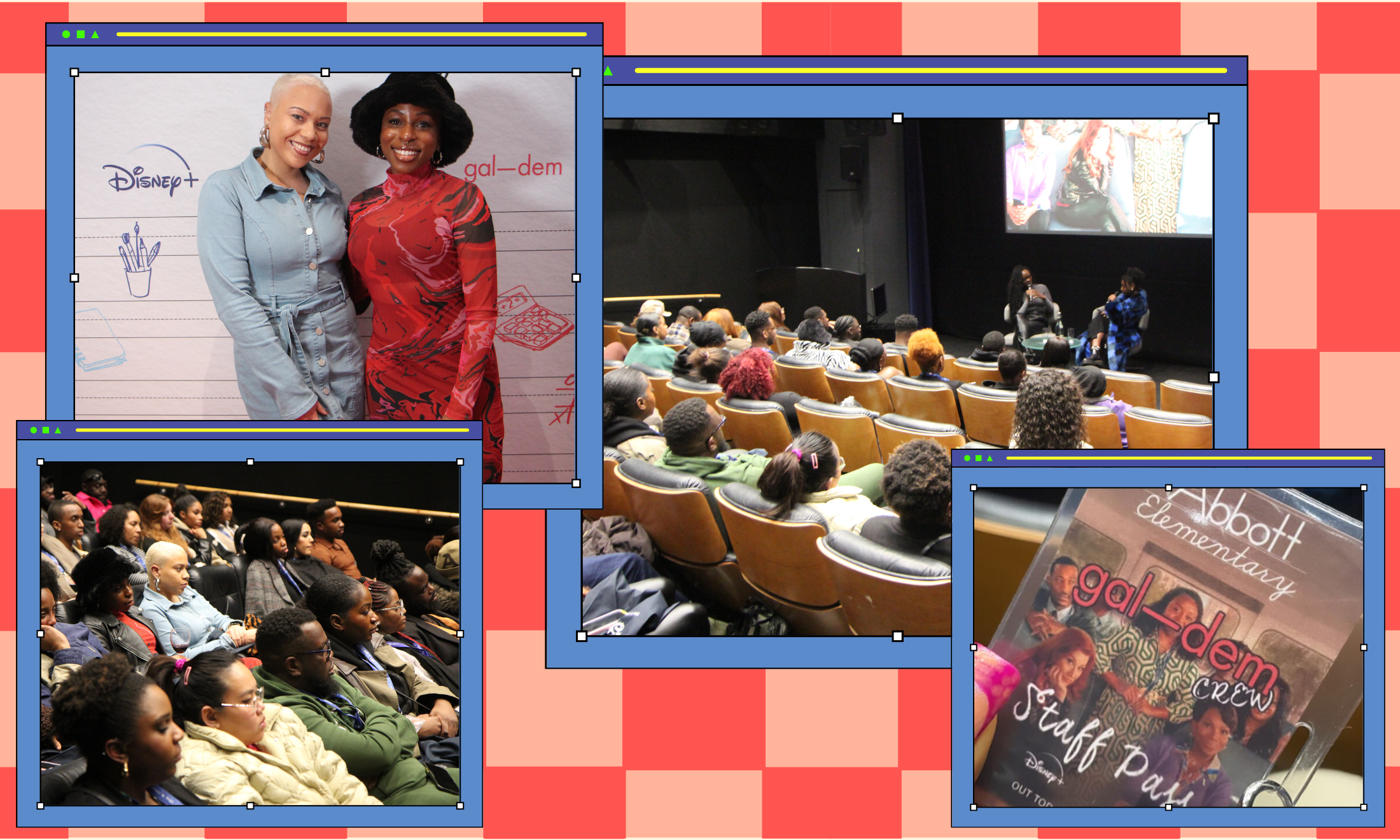
Illustration by Rama Duwaji
When asked about her writing practice in an interview with the Missouri Review in 2002, Jamaica Kincaid said “as someone with focus and self-determination… Those are words and descriptions I shy away from. I consider them, in fact, sort of false”. As a young person surrounded by other young people navigating the transition from student to full-time worker, from young person to adult, these words struck me. Ideas about hard work pervade our lives. They convince us that it is the work we do that gives our lives meaning and that only hard work merits access to luxury. We only deserve a stable and enjoyable life if we work for it. Work looms over our lives from the moment we are born.
The question “what do you want to be when you grow up?” encapsulates how easily what we do becomes who we are. We tailor our education with this question in mind and put away creative ambitions because of the practicality that a working life requires. As a teenager, I remember being shown a list of jobs organised by pay grade during a school lesson. This exercise was supposed to teach us that sometimes the work that appeals to us the most won’t provide us with a “secure” future. But who defines security and why? Why are the parameters of a good life measured by the work we are forced to undertake to survive?
I embrace laziness because laziness offers us the opportunity to be politically and socially valued by virtue of our existence. My laziness comes in the form of daily acts of refusal: a refusal to be the “right” kind of woman; a refusal to let how much I earn define my sense of self; a refusal to actively bolster racist, sexist capitalism. Laziness completely opposes individualism. If we all woke up tomorrow and decided to stop working, what could happen? In order to be lazy together, we have to first recognise that we need one another.
“I embrace laziness because laziness offers us the opportunity to be politically and socially valued by virtue of our existence”
The neoliberal economy is built on precarity. Nowadays, young people are slipping in and out of insecure work situations and more are opting to pick up freelance work on the side just to survive. We no longer do one thing for the rest of our lives – and many of us have to monetise our interests in the form of “side hustles”.
This environment feeds the myth of the hard worker. Can’t find a job? You simply have to work harder. Can’t afford anywhere to live? Save more. In 2017, Australian millionaire Tim Gurner argued that young people could avoid the devastating consequences of the housing crisis by simply cutting back on avocado toast. Money-management schemes have boomed in the last decade, with apps like Monzo reminding us of our daily spend. The grind is endless.
Laziness is despised because it challenges the primacy of capitalist thinking. In a 1987 interview with Women’s Own, Margaret Thatcher famously proclaimed “there is no such thing as society”, only individual men and women. She furthered the idea that reliance was a transgression; she implied that the worst thing you could be is lazy. If you don’t work, you’re a drain on society. Growing up in working-class communities showed me the impact of this rhetoric: it breeds internalised shame, which obscures the fact that no matter how hard you work, many of us have no control over the conditions of our lives.
In the UK, 10 years of austerity introduced by a Conservative government has further embedded an understanding that to do nothing means to be nothing. A regime of cuts, the sale of publicly owned services to the private sector and reduced investment in communities has created an environment that valorises the individual and their ability to get on in the world. If you’re not constantly aiming to be the best and most complete version of yourself, you hover outside of the realm of full humanity.
The children of immigrants internalise the myth early on. My parents taught me that if I worked hard, that hard work would be rewarded. Enjoy later the car, the big house and, most importantly, a sense of belonging. This is the logic that underpins the migrant story; you move because the grass is greener on the other side. Because there is an opportunity to reach for something, to move beyond the stagnancy of colonial legacies in your own home. Hard work is tied up with the promise of the nation.
“My parents taught me that if I worked hard, that hard work would be rewarded. Enjoy later the car, the big house and, most importantly, a sense of belonging”
But the promise usually always in disappointment. In The Lonely Londoners Trinidian-born author, Sam Selvon writes about the grim realities of London and the disappointment that occurs when the nation breaks its promise of prosperity. That disappointment is carried in the bodies of those who die at the border, those who are deported by fascist regimes, the 34,361 people and counting who have died avoidable deaths trying to reach Europe.
All the language that defines the lives of migrants is the language of hard work. It is near impossible to make a public argument for the lazy migrant, who “comes over here” and refuses to work, relies on welfare systems and gives nothing back. Migrants are legitimised by how they help the economy grow, strengthen services and take jobs no one else is willing to do. The myth of hard work is premised on the idea that there’s a finite amount of resources to be shared. It turns our welfare systems into dwindling, fragile relics and in doing so, hides the ways that this is orchestrated by a regime of cuts and purposeful underfunding.
We already have a world with all the resources necessary to care for us all. Capitalism and the myth of the hard worker are key ideological tools that turn freedom into something utopian instead of merely an achievable reality.
In another world that we could begin to imagine together, laziness is not the failure of being human. Embracing laziness would mean embracing a world where you weren’t punished for not doing, for being too fat or too sick or too black to be productive.
In a world without capitalism, “work” as we know it would be completely transformed. We would have more time and energy to put towards projects that weren’t based on extraction. Imagine the ways we would relate to one another – we’d make more art and write because we were compelled to, not because we had bills to pay. Laziness means more time to care for each other in collective ways, more good food shared, new modes of loving, improved ways of being and comforting one another, more joy radiating throughout our bodies. Having everything to gain from doing nothing. Laziness is a feeling and a set of actions. It means the abolition of everything we know now: the family, the state, prisons, the police.
Under our current conditions, laziness is radical. To refuse to adhere to a linear understanding of time, of success, to refuse a goal-orientated life recognises poet Wendy Trevino’s idea that “we can’t individually ‘win’ in this world / and simultaneously create another / Together”. When I write that the future will be lazy, I mean that we might actually, finally, be able to rest.
Taken from gal-dem’s print issue UN/REST, on sale now






